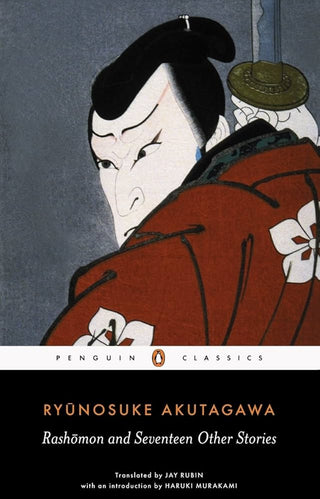June's book pick for da Shop's Japanese fiction book club discussion on Saturday June 7 at 10:15 a.m. (more copies on order; check back online or call the bookstore customer service desk at 808-421-9460).
The best stories by the father of the Japanese short story—including the two that inspired Kurosawa’s classic samurai film about the subjectivity of truth—featuring an introduction by Haruki Murakami
Ryünosuke Akutagawa is one of Japan’s foremost stylists—a modernist master whose short stories are marked by highly original imagery, cynicism, beauty and wild humour. “Rashömon”and “In a Bamboo Grove” inspired Kurosawa’s magnificent film and depict a past in which morality is turned upside down, while tales such as “The Nose,” “O-Gin” and “Loyalty” paint a rich and imaginative picture of a medieval Japan peopled by Shoguns and priests, vagrants and peasants. And in later works such as “Death Register,” “The Life of a Stupid Man,” and “Spinning Gears,” Akutagawa drew from his own life to devastating effect, revealing his intense melancholy and terror of madness in exquisitely moving impressionistic stories.
June's book pick for da Shop's Japanese fiction book club discussion on Saturday June 7 at 10:15 a.m. (more copies on order; check back online or call the bookstore customer service desk at 808-421-9460).
The best stories by the father of the Japanese short story—including the two that inspired Kurosawa’s classic samurai film about the subjectivity of truth—featuring an introduction by Haruki Murakami
Ryünosuke Akutagawa is one of Japan’s foremost stylists—a modernist master whose short stories are marked by highly original imagery, cynicism, beauty and wild humour. “Rashömon”and “In a Bamboo Grove” inspired Kurosawa’s magnificent film and depict a past in which morality is turned upside down, while tales such as “The Nose,” “O-Gin” and “Loyalty” paint a rich and imaginative picture of a medieval Japan peopled by Shoguns and priests, vagrants and peasants. And in later works such as “Death Register,” “The Life of a Stupid Man,” and “Spinning Gears,” Akutagawa drew from his own life to devastating effect, revealing his intense melancholy and terror of madness in exquisitely moving impressionistic stories.
Questions?



